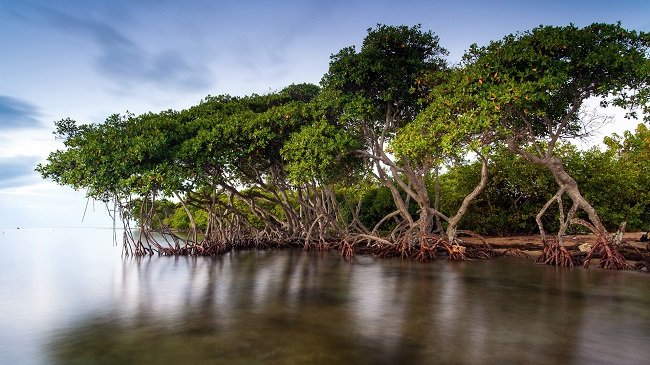– Advertisement –
Lagos’ mangrove forests, once lush and teeming with biodiversity, are rapidly disappearing under the pressure of urban development and unregulated land reclamation. Environmental advocates warn that the continued degradation of these vital ecosystems could have catastrophic consequences for the city’s air quality, flood control systems, and public health.


Desmond Majekodunmi, Chairman of the Lekki Urban Forest and Animal Shelter Initiative (LUFASI), has sounded the alarm on the human activities degrading Lagos’ mangrove ecosystems. Speaking during this year’s International Forest Day, he decried the large-scale sand filling and dredging taking place across the city.
“A lot of damage has been caused by sand filling,” Majekodunmi explained. “Sand is dredged from lagoons and poured into mangrove areas to create land for buildings. This causes tremendous harm to biodiversity, including aquatic fauna, bird species, and vital plant life.”
There’s also the climate and health impact of mangrove loss, which Majekodunmi talked about. He highlighted the crucial role mangroves play in climate mitigation and public health.
“Mangroves are incredibly effective at sequestering carbon dioxide and filtering air pollutants,” he noted. “In a city like Lagos, where millions of people use generators and vehicles, the forest’s role in purifying the atmosphere is essential. As we lose mangroves, we lose that protection.”
He further stressed that mangroves absorb excess rainfall, making them critical to flood management in the face of intensifying climate change. “The forests are being depleted rapidly, and with more rain falling due to global warming, the risk of flooding increases.”
Beyond air quality, mangroves act as natural water purifiers. Their roots filter contaminants, protect marine ecosystems, and provide breeding grounds for various fish species. “When we remove mangrove forests, we worsen water pollution and destroy habitats for countless aquatic species,” Majekodunmi warned.
Reflecting on his own experience growing up in Lagos, Majekodunmi recalled how natural green spaces have been overtaken by urban sprawl.
“The biggest driver of forest loss is the mass movement of people into Lagos over the decades. The city’s forested areas, especially mangroves, have been replaced by real estate developments.”
He noted that the unique characteristics of mangroves often lead to their undervaluation. “They don’t look like traditional forests, but they are among the most efficient carbon sinks and serve as breeding grounds for aquatic life.”
Urbanisation and Alarming Statistics
Dr. Adewunmi Ade Adeyemi, Deputy Director of Forestry at the Lagos State Ministry of Agriculture, shared an alarming data: Lagos loses vast forest areas daily to accommodate a growing population.
“A study revealed that 6,000 people move into Lagos each day. As of 2020, only 0.02% of Lagos’ landmass remained forested, and just 1,171 hectares of that is upland,” Adeyemi said.
He explained that forested lands are being consumed not by natural disasters but by deliberate land reclamation projects.
“We’re removing trees that act as carbon and methane sinks. This increases the city’s carbon footprint.”
Dr. Adeyemi linked forest loss to alarming pollution statistics. “Lagos’ air pollution index stands at 64 micrograms per cubic meter, six times higher than the WHO’s recommended limit. Removing tree cover contributes directly to this deadly trend.”
He criticised the growing demand for personal homeownership. “If every Lagos resident demanded just one plot of land, we would need over 1.6 million hectares. This is unsustainable in a state with so little available upland.”
Weak Enforcement of Existing Laws
Despite the existence of forest protection laws in Lagos, enforcement is weak. Dr. Adeyemi cited the Forest Law Cap F6 and Soil Conservation Law Cap F7, which restrict entry and development in sensitive areas.
“Yet these laws are often ignored in favour of housing developments.”
He also mentioned that wildlife, such as monkeys, increasingly invade human settlements because their natural habitats are being destroyed. “People complain, but they are the ones encroaching on animal habitats.”
To counter these trends, Dr. Adeyemi called for stronger advocacy and legal reform. “There’s an ongoing review of forestry laws to reflect current realities, and inter-agency collaboration is crucial to enforce these regulations.”
This year’s International Forest Day theme, “Forests and Food,” emphasises the critical role forests play in food security and livelihoods. Lagos’ mangrove forests support fisheries, provide storm protection, and purify natural resources essential to daily life.
The continued destruction of Lagos’ mangrove forests is not only an ecological disaster but an economic and public health crisis. Without immediate intervention through legal reforms, enforcement, and public awareness, the city risks losing one of its most valuable natural assets.
As Desmond Majekodunmi aptly puts it, “Destroying mangroves is like cutting off our own lifeline. We must act now to preserve them for future generations.”
By Ajibola Adedoye









